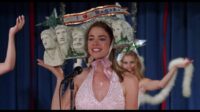Sometimes we don’t have to have an auteur, post ironic, pastiche piece. Sometimes we just need a damn good thriller and that’s exactly what See For Me gives you. Not that it doesn’t have directorial flourishes and themes to enjoy, but it’s the thrills that keep you engaged from beginning to end.
Sophie was a promising downhill skier, until blindness took her dreams away. Now she’s angry, shrugging off the tender ministrations of her mom and making her money by house sitting rather expensive properties. On her latest job, Sophie does her routine grift; calling a friend to take her through the layout of the house and taking a bottle of wine to sell on for an inflated price.
However, this time her friend feels he needs to make a moral choice – one of the continuous themes here – and they break their agreement. Which would be fine except Sophie shuts herself out of the property and has to negotiate the fancy security system to get herself back in. This means she has to use a new service her mom has found for her, “See For Me”, which connects her with a person who can, through her phone, see for her. Together, they get Sophie back in and that’s that. Isn’t it? Well, until 3 men arrive who seem to know the house and where the safe is. What does Sophie do? Hide away and ride it out? Call the cops? Take matters into her own hands? Well, it isn’t the first one, that’s for sure.
See For Me plays with perception. Sophie is blind and so becomes the epitome of the unreliable narrator; both narrator and audience are reliant on someone and something else to fill in the gaps. This works so well because we fill in the gaps too, we’re desperate to help, to be Sophie’s eyes, we “See For Her” and it brings us into the thriller beautifully.
There are also screens. Filters. Much of the action takes place through screens, Sophie being directed around the house, her “See For Me” buddy Kelly watching her from her room through a screen, communicating to another screen. Before she is called the first time by Sophie, she was playing cooperative video games through another screen. As Polygon has it; ‘Seen another way, Kelly is essentially a horror-movie fan with full freedom to yell “Don’t go that way, he’s waiting for you!” or “Pick up that gun and shoot him!” at the screen. There are floor to ceiling windows in the house, which would be the eyes of the house, but of course, Sophie has no use for those screens. And so we have no central narrator to trust, everyone has their view of what Sophie should be seeing, the interlopers have a view of what they expect to see, everyone is making their minds up for us and they are frequently wrong.
Cannily, the film also avoids a clean moral centre. Sophie has already been stealing from the houses she’s supposed to be guarding. The robbers have a skewed moral sense and among the trio, there’s an agent who wants to hurt first and work later. However, their mission may not be what you expect, and more information is dropped in later to make us question the validity of their quest. Writers Adam Yorke and Tommy Gushue don’t give us a steer. We’re left to make our minds up and that has a real audacity. Does it end happily for Sophie? If it does, it won’t be because of her unblemished moral compass. We are constantly being asked whether it’s OK to take people’s things; does how you’re doing it and why to make a difference? As director Okita says; ‘Sophie is no victim’ and it’s an interesting discussion and we’re constantly faced with having to ask ourselves here.
The action takes place in one setting, the house, big but contained. It may go outside occasionally, but that feels dangerous, and because it’s over a short period one evening, the whole thing takes place in the dark, with camera phones illuminating the action.
And then there’s Sophie’s blindness. The threat to her is visceral, but because she is relying on someone else to keep her safe, and consequently abdicating responsibility for it, by necessity, it feels a little more out of control. This raises another theme. Power. Who has the power here?
Logically, the 3 armed men should have the power, but from the beginning, they are put on the defensive by finding someone is in the house with them. Who has ultimate power here? The leader of the group on the ground, the foreman if you like, constantly defers to someone on the phone, the real boss, just as Sophie defers to her “See For Me” buddy. This places the power away from the action and adds to the feeling that no one is really in control here, no one knows what they’re doing, even when Sophie shoots a gun it’s through instruction – the henchmen don’t pick her off with ease, even though she lacks sight. So this film has a simple idea and a plot MacGuffin keeps the tension rising. It never really lets up, but it isn’t a manufactured thrill ride; it doesn’t need to be.
As Sophie, Skyler Davenport doesn’t tell us what to think. This is an honest performance and her moral ambiguity is there for all to see and completely unresolved; she may be in peril but we are unsure where her moral view is. This is not a lovable performance and never once is her blindness exploited to play to our sympathies. It’s a bold performance. Jessica Parker Kennedy does well with Kelly. She too has a moral base that has been questionable in the past, she’s ex-military and at one point begins to tell us what she may have done. Her function is to be the narrator here, to add energy because she can see what is happening; that’s difficult when you’re one removed and Kennedy manages it without making it look clunky. And although the 3 interlopers aren’t the 3 Stooges, they aren’t the cold-blooded killers we’re used to in the thriller genre; one of them may be gun-happy but he has no guile. They sometimes appear to be 3 constituent parts of one person, the head, the heart and the muscle.
Director Randall Okita has spoken of the cat and mouse game in this movie and what’s clear is that we are constantly unsure who is cat and who mouse; this is a break from the well-worn underdog for a 90 minute movie. Okita doesn’t use too many fast edits here, the shots are slower and reveal the danger, leaving us to decide when we see it and how we react to it.
As a thriller, it’s unpretentious yes, but with something pretty unique. Some people have concerns that the power struggle here is too even, but this is one of the delights of this movie. Okita has crafted a movie where the somewhat expected thriller trappings allow it to play with status, perception and morals. Shout out too to scriptwriters Gushue and Yorke who never press the thriller panic button. The script waxes and wanes, people make decisions within a heightened situation and human nature is tested, never whilst telling us what we should think.
There are incredibly suspenseful moments here, with moments of breath-holding brilliance in the quiet pursuits around the house leaving you wondering what just lies beyond the camera and phone camera’s vision. But this great film asks so many questions and never just provides you with the answers. As Variety said; ‘It’s as though Okita, Yorke and Gushue made a list of every mistake similar films have made in the past and set to eschew all of them.’ We can talk about Audrey Hepburn’s 1967 Wait Until Dark thriller, but perhaps the thriller with a gamer twist is closer. Either way, it’s a bit special.
See For Me is just what you expect. And entirely what you don’t expect too.



